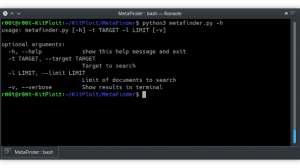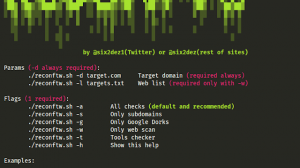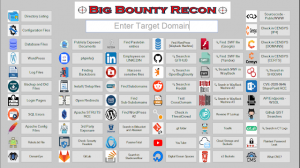[sc name=”ad_1″]
An overall introduction
When you run dawnscanner on your code it parses your project Gemfile.lock looking for the gems used and it tries to detect the ruby interpreter version you are using or you declared in your ruby version management tool you like most (RVM, rbenv, …).
Then the tool tries to detect the MVC framework your web application uses and it applies the security check accordingly. There checks designed to match rails application or checks that are appliable to any ruby code.
dawnscanner can also understand the code in your views and to backtrack sinks to spot cross site scripting and sql injections introduced by the code you actually wrote. In the project roadmap this is the code most of the future development effort will be focused on.
dawnscanner security scan result is a list of vulnerabilities with some mitigation actions you want to follow in order to build a stronger web application.
Installation
You can install latest dawnscanner version, fetching it from Rubygems by typing:
$ gem install dawnscanner If you want to add dawn to your project Gemfile, you must add the following:
group :development do
gem 'dawnscanner', :require=>false
endAnd then upgrade your bundle
$ bundle installYou may want to build it from source, so you have to check it out from github first:
$ git clone https://github.com/thesp0nge/dawnscanner.git
$ cd dawnscanner
$ bundle install
$ rake installAnd the dawnscanner gem will be built in a pkg directory and then installed on your system. Please note that you have to manage dependencies on your own this way. It makes sense only if you want to hack the code or something like that.
Usage
You can start your code review with dawnscanner very easily. Simply tell the tool where the project root directory.
Underlying MVC framework is autodetected by dawnscanner using target Gemfile.lock file. If autodetect fails for some reason, the tool will complain about it and you have to specify if it’s a rails, sinatra or padrino web application by hand.
Basic usage is to specify some optional command line option to fit best your needs, and to specify the target directory where your code is stored.
$ dawn [options] targetIn case of need, there is a quick command line option reference running dawn -h at your OS prompt.
$ dawn -h
Usage: dawn [options] target_directory
Examples:
$ dawn a_sinatra_webapp_directory
$ dawn -C the_rails_blog_engine
$ dawn -C --json a_sinatra_webapp_directory
$ dawn --ascii-tabular-report my_rails_blog_ecommerce
$ dawn --html -F my_report.html my_rails_blog_ecommerce
-G, --gem-lock force dawn to scan only for vulnerabilities affecting dependencies in Gemfile.lock (DEPRECATED)
-d, --dependencies force dawn to scan only for vulnerabilities affecting dependencies in Gemfile.lock
Reporting
-a, --ascii-tabular-report cause dawn to format findings using tables in ascii art (DEPRECATED)
-j, --json cause dawn to format findings using json
-K, --console cause dawn to format findings using plain ascii text
-C, --count-only dawn will only count vulnerabilities (useful for scripts)
-z, --exit-on-warn dawn will return number of found vulnerabilities as exit code
-F, --file filename tells dawn to write output to filename
-c, --config-file filename tells dawn to load configuration from filename
Disable security check family
--disable-cve-bulletins disable all CVE security checks
--disable-code-quality disable all code quality checks
--disable-code-style disable all code style checks
--disable-owasp-ror-cheatsheet disable all Owasp Ruby on Rails cheatsheet checks
--disable-owasp-top-10 disable all Owasp Top 10 checks
Flags useful to query Dawn
-S, --search-knowledge-base [check_name] search check_name in the knowledge base
--list-knowledge-base list knowledge-base content
--list-known-families list security check families contained in dawn's knowledge base
--list-known-framework list ruby MVC frameworks supported by dawn
--list-scan-registry list past scan informations stored in scan registry
Service flags
-D, --debug enters dawn debug mode
-V, --verbose the output will be more verbose
-v, --version show version information
-h, --help show this helpRake task
To include dawnscanner in your rake task list, you simply have to put this line in your Rakefile
require 'dawn/tasks'Then executing $ rake -T you will have a dawn:run task you want to execute.
$ rake -T
...
rake dawn:run # Execute dawnscanner on the current directory
...Interacting with the knowledge base
You can dump all security checks in the knowledge base this way
$ dawn --list-knowledge-baseUseful in scripts, you can use --search-knowledge-base or -S with as parameter the check name you want to see if it’s implemented as a security control or not.
$ dawn -S CVE-2013-6421
07:59:30 [*] dawn v1.1.0 is starting up
CVE-2013-6421 found in knowledgebase.
$ dawn -S this_test_does_not_exist
08:02:17 [*] dawn v1.1.0 is starting up
this_test_does_not_exist not found in knowledgebasedawnscanner security scan in action
As output, dawnscanner will put all security checks that are failed during the scan.
This the result of Codedake::dawnscanner running against a Sinatra 1.4.2 web application wrote for a talk I delivered in 2013 at Railsberry conference.
As you may see, dawnscanner first detects MVC running the application by looking at Gemfile.lock, than it discards all security checks not appliable to Sinatra (49 security checks, in version 1.0, especially designed for Ruby on Rails) and it applies them.
$ dawn ~/src/hacking/railsberry2013
18:40:27 [*] dawn v1.1.0 is starting up
18:40:27 [$] dawn: scanning /Users/thesp0nge/src/hacking/railsberry2013
18:40:27 [$] dawn: sinatra v1.4.2 detected
18:40:27 [$] dawn: applying all security checks
18:40:27 [$] dawn: 109 security checks applied - 0 security checks skipped
18:40:27 [$] dawn: 1 vulnerabilities found
18:40:27 [!] dawn: CVE-2013-1800 check failed
18:40:27 [$] dawn: Severity: high
18:40:27 [$] dawn: Priority: unknown
18:40:27 [$] dawn: Description: The crack gem 0.3.1 and earlier for Ruby does not properly restrict casts of string values, which might allow remote attackers to conduct object-injection attacks and execute arbitrary code, or cause a denial of service (memory and CPU consumption) by leveraging Action Pack support for (1) YAML type conversion or (2) Symbol type conversion, a similar vulnerability to CVE-2013-0156.
18:40:27 [$] dawn: Solution: Please use crack gem version 0.3.2 or above. Correct your gemfile
18:40:27 [$] dawn: Evidence:
18:40:27 [$] dawn: Vulnerable crack gem version found: 0.3.1
18:40:27 [*] dawn is leavingWhen you run dawnscanner on a web application with up to date dependencies, it’s likely to return a friendly no vulnerabilities found message. Keep it up working that way!
This is dawnscanner running against a Padrino web application I wrote for a scorecard quiz game about application security. Italian language only. Sorry.
18:42:39 [*] dawn v1.1.0 is starting up
18:42:39 [$] dawn: scanning /Users/thesp0nge/src/CORE_PROJECTS/scorecard
18:42:39 [$] dawn: padrino v0.11.2 detected
18:42:39 [$] dawn: applying all security checks
18:42:39 [$] dawn: 109 security checks applied - 0 security checks skipped
18:42:39 [*] dawn: no vulnerabilities found.
18:42:39 [*] dawn is leavingIf you need a fancy HTML report about your scan, just ask it to dawnscanner with the --html flag used with the --file since I wanto to save the HTML to disk.
$ dawn /Users/thesp0nge/src/hacking/rt_first_app --html --file report.html
09:00:54 [*] dawn v1.1.0 is starting up
09:00:54 [*] dawn: report.html created (2952 bytes)
09:00:54 [*] dawn is leavingUseful links
Project homepage: http://dawnscanner.org
Twitter profile: @dawnscanner
Github repository: https://github.com/thesp0nge/dawnscanner
Mailing list: https://groups.google.com/forum/#!forum/dawnscanner
Thanks to
saten: first issue posted about a typo in the README
presidentbeef: for his outstanding work that inspired me creating dawn and for double check comparison matrix. Issue #2 is yours 🙂
marinerJB: for misc bug reports and further ideas
Matteo: for ideas on API and their usage with github.com hooks





















Add Comment